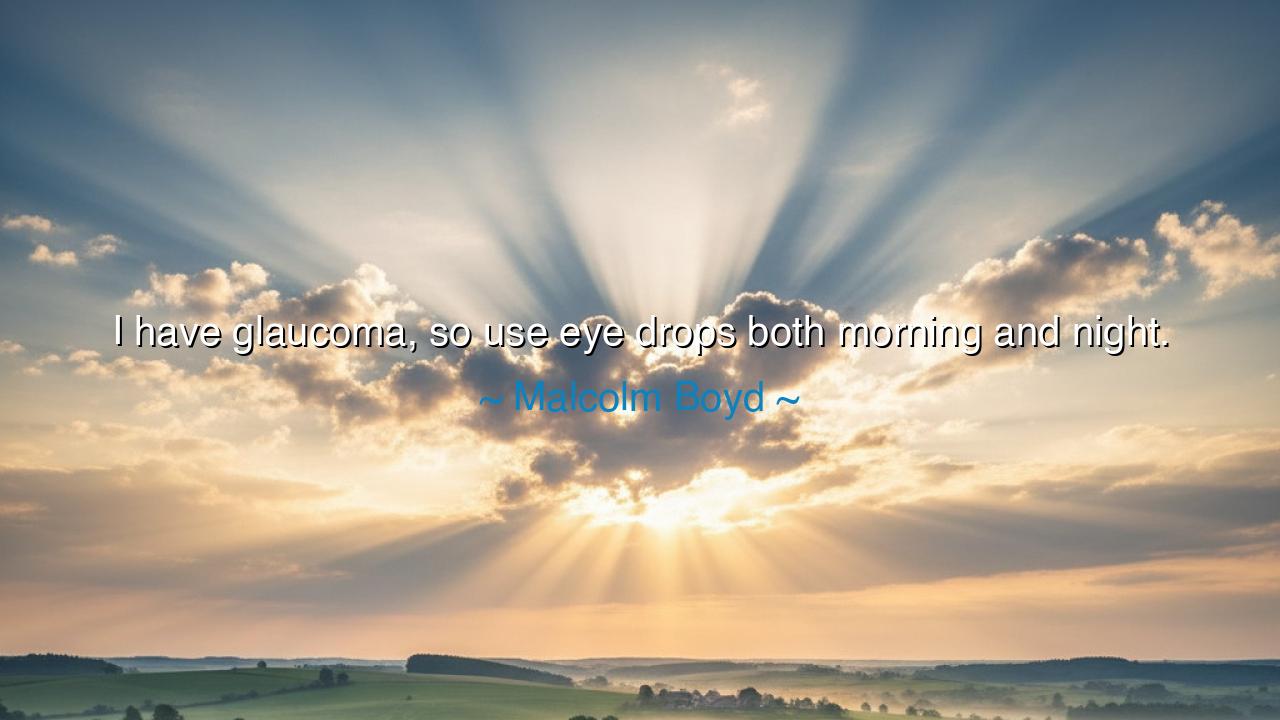
I have glaucoma, so use eye drops both morning and night.






"I have glaucoma, so use eye drops both morning and night." Thus spoke Malcolm Boyd, priest, writer, and activist, a man who gave voice to truth even in the quiet testimony of his own frailty. At first glance, his words may seem merely practical, a confession of daily medical ritual. Yet beneath their plainness lies a teaching: that life, with all its grandeur, is still bound by the small and steady acts of care that preserve it. To live, to see, to serve—these require discipline, humility, and the acceptance of human limitation.
The mention of glaucoma is no mere detail of sickness, but a symbol of the fragility of the human body. The eyes—those windows of the soul, those lights by which we behold the beauty and suffering of the world—are threatened by shadow. Without treatment, vision fades, clarity dims, and the outer world becomes clouded. But with vigilance, with drops applied morning and night, the gift of sight is preserved. In this ritual, Boyd shows us that even the smallest acts, repeated faithfully, are the guardians of great blessings.
There is humility here, too. For Boyd, who marched beside Martin Luther King Jr., who spoke truth to power and carried the weight of moral struggle, reveals himself bound by the same necessities as all of us. No matter how mighty one’s deeds, the body demands attention. Greatness does not exempt us from discipline; indeed, greatness is built upon it. To admit dependence upon something so small as eye drops is to remind us that no life is too grand to escape the ordinary, and that true strength comes in acknowledging our dependence, not denying it.
History offers us examples of this truth. Consider Galileo Galilei, whose vision dimmed in his old age even as his insight into the heavens blazed with brilliance. Though blindness crept upon him, his discipline of thought and study did not waver. Or recall John Milton, who, though blind, gave the world Paradise Lost, dictating from memory lines of fire that still burn in the human imagination. Like Boyd, these men reveal that fragility and greatness walk hand in hand, and that the discipline to face weakness often births the most enduring strength.
The rhythm of morning and night is also significant. It calls to mind the cycle of existence itself: beginnings and endings, dawns and dusks, the daily rituals that sustain us in the march of time. To place drops in the morning is to prepare for the day’s vision, to awaken the eyes to light. To place them at night is to preserve the eyes against darkness, to ensure that tomorrow may also be seen. In this small act, there is a profound echo of the eternal: vigilance is not occasional, but constant, woven into every rising and resting.
The lesson is clear: life’s treasures, whether vision, strength, or wisdom, are not preserved by grand gestures alone, but by daily acts of care. Neglect what seems small, and you will lose what is great. Boyd’s words remind us that discipline is the price of preservation, that vigilance is the guardian of blessings. The greatest victories are not always public or dramatic—they are often the quiet triumphs of persistence, the refusal to surrender to decline, the faithfulness of morning and night.
Practical action must follow. Ask yourself: what small disciplines sustain your life? Perhaps it is medicine, or prayer, or the tending of relationships, or the work of your craft. Do them faithfully, without pride or resentment. Honor the rituals that preserve your vision—whether of the eyes, the mind, or the spirit. Do not wait for crisis; prepare daily, so that the gifts you cherish may endure.
Thus Malcolm Boyd, through a simple reflection on glaucoma and eye drops, passes down a teaching as old as time: greatness is not freedom from fragility, but faithfulness in the face of it. Care for what is small, and you will preserve what is priceless. Tend your mornings and your nights, and you will keep the light of life burning, even when shadows press close.






AAdministratorAdministrator
Welcome, honored guests. Please leave a comment, we will respond soon